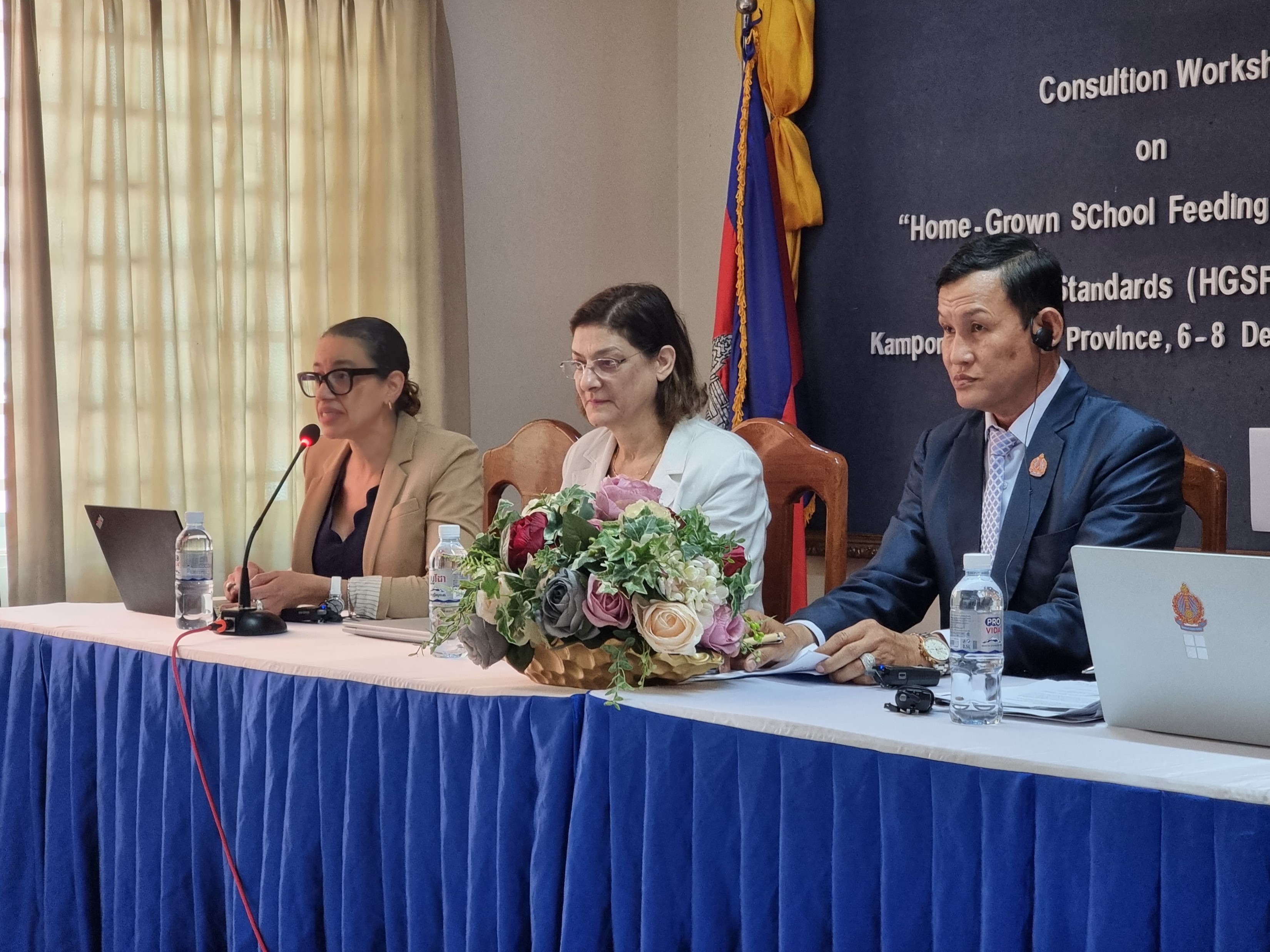Cambodian stakeholders, FAO and WFP gather to discuss nutrition standards for school meals, paving the way for piloting phase in schools

From 6th to 8th December 2023, the Cambodian Ministry of Education, Youth and Sports (MoEYs) in collaboration with the Food and Agriculture Organization of the United Nations (FAO) and the World Food Programme (WFP) are holding a consultation workshop on school meal nutrition standards. The workshop, being held in Kampong Chhnang, is attended by representatives of Cambodian ministries and public agencies, technical officers and representatives of FAO and WFP at country office and headquarters levels, as well as by international development partners participating in person and online.
School meals often play a key role in children and adolescents’ diets: in Cambodia alone, about 290 000 children received meals in school last year. It is therefore essential that the planning of such meals responds to nutritional, educational and sociocultural priorities while being aligned with the possibilities of the school food system. This can be enabled by setting and applying school meal nutrition standards (SMNS), a set of rules and recommendations, based on sound nutrition science and the local context, that guide the composition of school meals in order to improve their nutrition adequacy. For example, SMNS ensure that school meals provide an adequate proportion of children’s energy and key nutrient requirements while limiting the amount of added sugars and sodium, and that they are aligned with national food-based dietary guidelines for schoolchildren. SMNS can also provide recommendations for the mealtime experience, promoting the socialization and enjoyment of school mealtime to enhance children’s wellbeing and their positive perception of school meals.
In the framework of a joint project, FAO and WFP are finalizing a global methodology for countries to design their own school meal nutrition standards. In 2022, the project kicked off in Cambodia, where experts carried out a children’s food consumption assessment, a qualitative study on children’s meal practices and perceptions and a study on school food environments focused in the Oddar Meanchey, Pursat and Kampong Chhnang provinces, as well as a review of the national relevant legal framework and a capacity needs assessment.
The objective of the workshop is to present the preliminary results of these assessments, along with other evidence and existing nutrition criteria that currently guide school meal planning in Cambodia, and to agree on preliminary new school meal nutrition standards. Once validated, these SMNS will then be piloted in 2024 in 40 schools of the same provinces where the assessments were conducted. The main aim is to determine their impact on children’s diet quality, comparing the meals compliant with the new nutrition standards with conventional ones.
"Setting and implementing SMNS is one of the most effective ways of ensuring that school meal programmes achieve their nutrition objectives. However, there are no clear indications on the best process to follow to develop them: hence the need for a global methodology, which we hope many countries will be able to use to develop their own SMNS." Fatima Hachem, Senior Nutrition Officer in FAO’s Food and Nutrition Division.
"The development process of the SMNS is providing an excellent opportunity for collaboration and support between Cambodian national stakeholders, FAO and WFP, at country office and headquarters levels. When we work elbow-to-elbow with a range of stakeholders for a common goal we achieve great results, and we look up to Cambodia for inspiring others in this process." Rebekah Bell, FAO Representative in Cambodia.
"Children and adolescents need regular access to nutritious meals, this can ensure they are healthy and able to learn. The standards will support decisions on what and how menus are planned and will help to improve the quality, quantity and adequacy of what children get in schools." Peter Holtsberg, Senior Programme Policer Officer for School-based programmes, WFP.
"As the Cambodian home-grown school feeding programme transitions to national ownership, developing updated nutrition standards provides a critical opportunity to ensure that the programme continues to achieve its objective of improving the nutritional status of nearly 300 000 Cambodian children – helping them to thrive, both now and in the future." Claire Conan, WFP Representative and Country Director.
"Exciting news! We're partnering with FAO and WFP to develop and pilot preliminary nutrition standards for school meals. Cambodia is playing a key role in this groundbreaking initiative, which will improve the nutritional adequacy of meals for students. Our methodology will not only benefit Cambodia but also serve as a model for other countries. Together, we're creating a healthier future for children worldwide. Stay tuned for updates on this transformative collaboration." Ven Thol, Deputy Director of Primary Education Department of MoEYS.
